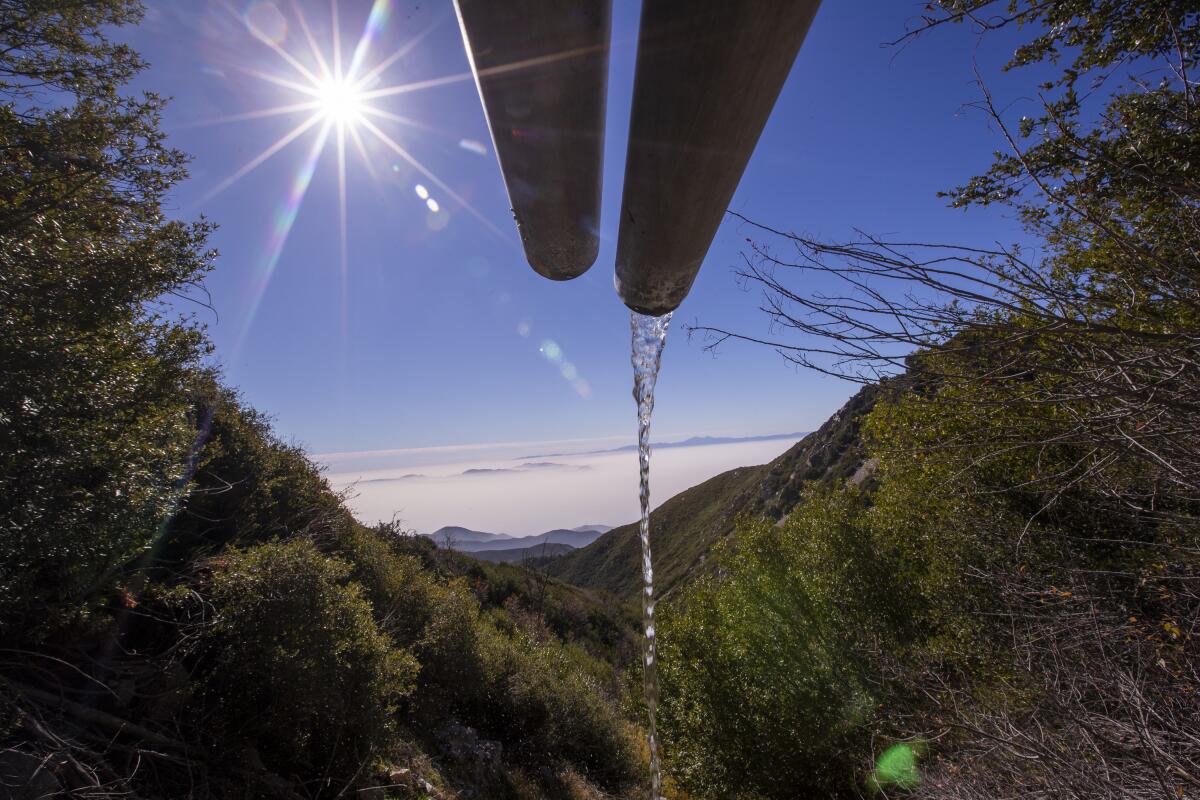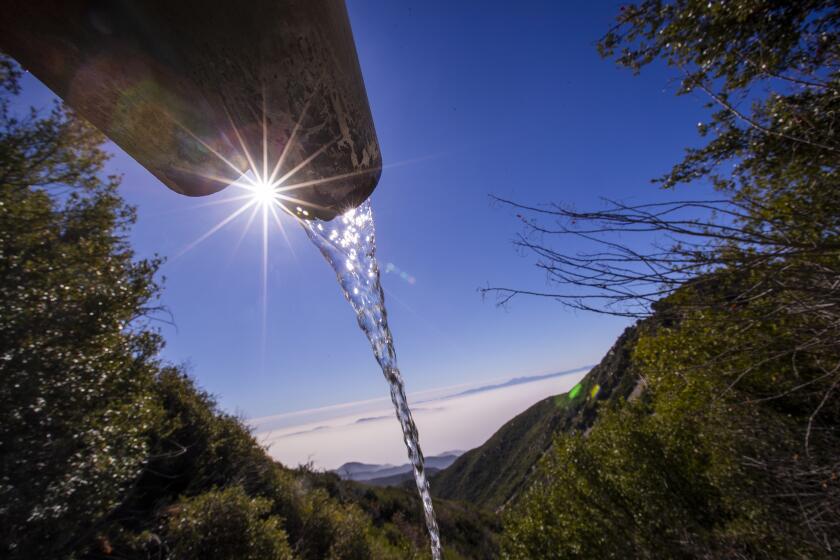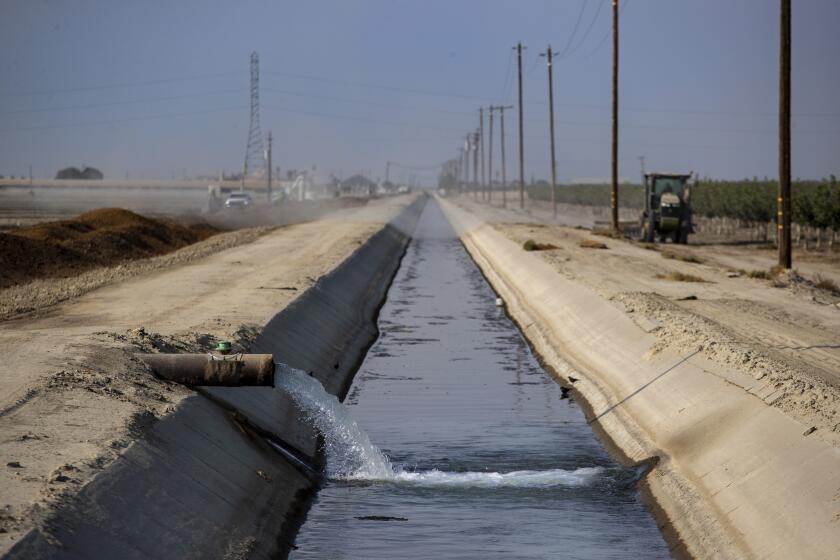California orders bottled water company to stop ‘unauthorized’ piping from springs

- Share via
For decades, water has been siphoned from springs in the San Bernardino Mountains and piped downhill to be bottled and sold as Arrowhead 100% Mountain Spring Water. After a years-long fight over the bottled water operation in the San Bernardino National Forest, California water regulators ruled Tuesday that the company must stop taking millions of gallons through its pipelines.
The State Water Resources Control Board voted unanimously to order the company BlueTriton Brands to “cease and desist” taking much of the water it has been piping from tunnels and boreholes in the mountains near San Bernardino.
Environmentalists, who have campaigned for years against bottling water from the forest, praised the decision.
“We’re incredibly pleased this unlawful removal of the public’s water from public lands will finally end,” said Michael O’Heaney, executive director of the nonprofit Story of Stuff Project.
A company is siphoning water from a national forest to sell as bottled water. California water regulators want to limit the operation.
The board’s members adopted the order after the agency’s staff determined the company has been unlawfully diverting water from springs without valid water rights.
The controversy erupted after a 2015 investigation by the Desert Sun revealed that the U.S. Forest Service was allowing Nestlé to continue siphoning water from the national forest using a permit that listed 1988 as the expiration date.
The Forest Service subsequently began a review of Nestlé’s permit, and in 2018 granted a new permit for up to five years. The revelations about Nestlé piping water out of the national forest sparked an outpouring of opposition and prompted several complaints to California regulators questioning the company’s water rights claims, which led to the state’s investigation.
BlueTriton Brands took over the bottled water business from Nestlé in 2021. Lawyers for the company argued during the hearing that the board’s process was rife with problems, and that they are entitled to continue using the water.
Aggressive and impactful reporting on climate change, the environment, health and science.
“The proposed order is inconsistent with existing rights,” said Robert Donlan, an attorney for the company. “The board simply has no authority to ignore the law.”
But the board disagreed and said the order upholds state law.
“The reality is that you see the interception of what is otherwise water that would be naturally flowing,” said board Chair E. Joaquin Esquivel. “This order not only protects these resources but helps maintain faith in the larger water rights system.”
Local environmentalists have argued the company’s pipeline removes precious water that would otherwise flow in Strawberry Creek and nourish the ecosystem. The system of 4-inch steel pipes collects water that flows with gravity from various sites on the steep mountainside above the creek.
“It’s sick. They sucked it dry and now fish can’t even live there,” said Amanda Frye, an activist who campaigned for years against the water-bottling. Frye, who lives in Redlands, spent long hours combing through historical archives researching the case, and repeatedly told the board the company lacked valid water rights.
Records show about 143 acre-feet (46.5 million gallons) flowed through the company’s network of pipes in 2021, filling a roadside tank where trucks pick up water and haul it to a bottling plant.
State officials ordered the company to immediately stop taking water for bottling from most of its water-collection tunnels and boreholes at 10 sites, but the order doesn’t cover three other boreholes that capture water.
California legislators passed a bill giving water regulators authority to investigate whether some of the state’s oldest water rights are valid.
A spokesperson for BlueTriton Brands said in an email that the company and its predecessors “have collected water from Arrowhead Springs in Strawberry Canyon in an environmentally responsible and sustainable way for more than 125 years.”
BlueTriton, based in Stamford, Conn., took over the operation when Nestlé Waters North America was purchased by private-equity firm One Rock Capital Partners and investment firm Metropoulos & Co.
The board’s order “marks a radical departure from express statutory limitations” and legal precedents concerning the agency’s water-rights permitting authority, the company said.
BlueTriton said the ruling “creates water rights uncertainty” and negatively affects other water users that rely on groundwater. The company said it will “vigorously defend our water rights through the available legal process.”
The State Water Board ordered BlueTriton to comply with the order by Nov. 1. The company has 30 days to appeal to the board.
The springs are the original source of Arrowhead brand bottled water, named after an arrowhead-shaped natural rock formation on the mountainside.
The company has said Arrowhead bottled water is sourced from 11 spring sites across California, as well as one spring in Colorado and another in British Columbia. The source north of San Bernardino is the only one located in a national forest.
Although the state’s order calls for halting “unauthorized diversions” of water, it doesn’t prevent BlueTriton from continuing to divert water in the same pipeline under other rights to the long-vacant Arrowhead Springs hotel property, which is owned by the San Manuel Band of Mission Indians.
The company has for years had a federal “special-use” permit allowing it to use its pipeline and other water infrastructure in the national forest, paying an annual fee that as of last year was $1,950. There has been no fee for using the water.
Dave Anderson, the national forest’s special uses and lands program manager, said the agency will respond once the ruling is officially in print. Based on the decision, Anderson said he expects “we will not be able to issue them a permit” because the agency requires applicants to present proof of water rights.
State officials said the order effectively restricts 80% of BlueTriton’s diversions from the watershed.
Jule Rizzardo, assistant deputy director of the agency’s water rights division, served as the lead prosecutor and said the case is the most important she has worked on in her 25-year career.
“This enforcement action illustrates the power of public participation, the impacts of unauthorized diversion and the need for accountability,” Rizzardo said.
Roberto Cervantes, the board’s supervising engineer, said the public involvement in the case, which included thousands of comments submitted, “proves that when the community unites, even giants can be held accountable.”
Frye, who filed one of the complaints that prompted the state’s investigation, said she thinks the result “shows that the public does have a voice.”
“It’s California’s water, so it goes for the people of California — and for the forest,” Frye said. “I’m hoping that we can see Strawberry Creek flow again, the springs back to their natural state, and the forest ecosystem return to what it was before the diversions.”
Rachel Doughty, a lawyer for Story of Stuff Project, said the involvement of Frye and other local people over the last several years was instrumental in leading to the board’s decision. She said the conclusions of the state’s investigation were clear, and that while public resources were taken and depleted over the last century, the company and its predecessors “were raking in profits and misrepresenting their right to the water.”
Lisa Belenky, senior counsel for the Center for Biological Diversity, said by adopting the order, the state has taken “a critical first step toward protecting this creek and Strawberry Canyon’s springs, as well as the fish, wildlife and riparian vegetation that depend on these waters.”
Steve Loe, a retired Forest Service biologist who has called for shutting down the pipeline, said he was thrilled about the decision.
“Getting the water back into the stream and creeks will allow them and surrounding habitat to recover, benefiting all plants and wildlife,” Loe said.












